Financed Research Projects and Studies
Below are several research-funded projects for which I have been fortunate to be granted money and support from various public institutional research or scientific organizations. To date, I have won € 2 320 464,00 that has been directly awarded to my institution as either PI or Co-PI from projects in which I have partnered with a value totaling € 33 543 414,00.
DeCoInter – Decarbonization of Maritime Sector and its Impact on Green Energy Transition
DeCoInter project – Decarbonization of Maritime Sector and its Impact on Green Energy Transition. Funding agency: EU Interreg South Baltic Programme 2021-2027. Project Partner budget: €309 240.00 overall project budget €4 500 000.00. Sole Partner from BTH and responsible – Principal Investigator, PI (100%). Project no. STHB.02.01-IP.01-002/24
The DeCoInter project, titled “Decarbonization of Maritime Sector and its Impact on Green Energy Transition,” seeks to develop innovative solutions to significantly reduce carbon emissions within the maritime sector, advancing the EU’s green energy transition goals.
Led by the Association of Polish Regions of the Baltic Adriatic Transport Corridor, the DeCoInter project operates under the Interreg South Baltic Programme 2021-2027 and focuses on several core objectives:
- Developing and implementing strategies to decarbonize maritime activities across the South Baltic region.
- Promoting the adoption of green energy solutions among key maritime stakeholders.
- Assessing the broader impact of maritime decarbonization on the transition to green energy.
DeCoInter aims to foster a sustainable, eco-friendly maritime industry through these initiatives, aligning closely with the European Union’s wider objectives for a green energy transition.
https://southbaltic.eu/-/projects-from-the-3rd-call-for-proposals-selected-for-funding-by-the-monitoring-committee
AIKnowIT - Hub for AI and IT Knowledge and cooperation between universities and SMEs
AIKnowIT – Hub for AI and IT Knowledge and cooperation between universities and SMEs. Funding agency: EU Interreg South Baltic Programme 2021-2027. Project Partner budget: €59 000.00 overall project budget €500 000.00. Sole Partner from BTH and responsible – Principal Investigator, PI (100%). Project No. STHB.01.01-IP.01-0003/24
Build platform for cooperation between universities and SMEs to enable exchange of knowledge and strengthen the connectivity by empowering digital innovation by application of artificial intelligence and cybersecurity solutions.
DigiTechPort2030 – Digital Excellence for Decarbonisation of Port-City Ecosystems for Efficient Environmental & Energy Management towards South Baltic Fit-for-55
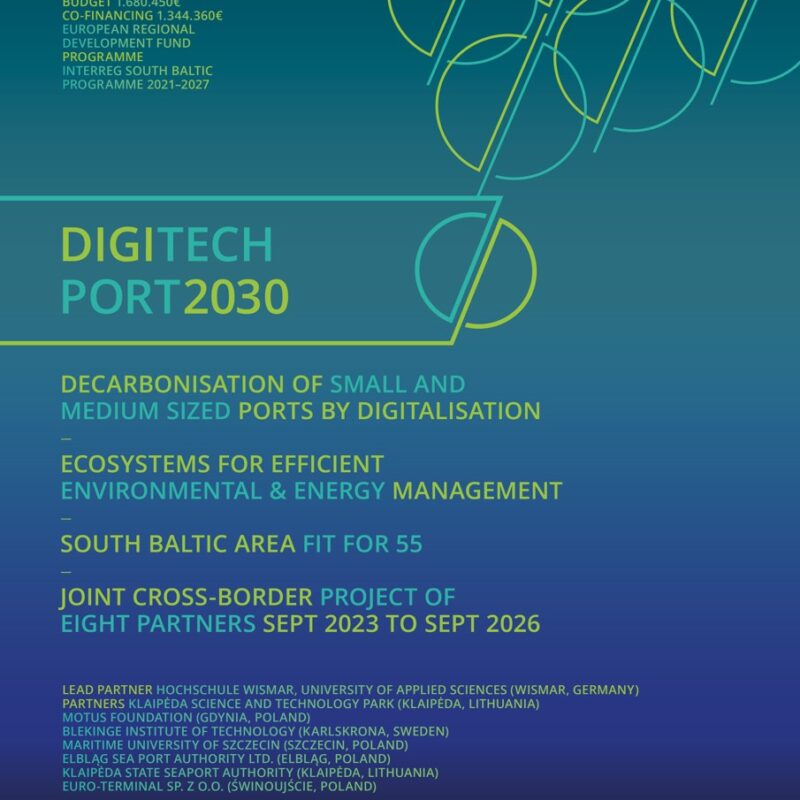
DigiTechPort2030 – Digital Excellence for Decarbonisation of Port-City Ecosystems for Efficient Environmental and Energy Management towards South Baltic Fit for 55. Funding agency: EU Interreg South Baltic Programme 2021-2027. Project Partner budget: €260 050.00 overall project budget €1 680 450.00. Sole Partner from BTH and responsible – Principal Investigator, PI (100%). Project No. STHB.02.01-IP.01-0002/23
Currently, the European Commission is setting the scene for future maritime industry and transportation and, in this, also for ports in the South Baltic Sea Region. EU Green Deal, IMO Fit for 55 and the new EU maritime Fuel regulations will additionally establish clear targets in terms of emissions and environmental aspects that need to be accomplished by the industry already in 2025 as well as 2030 and 2050. In this, there is a huge pressure to increase the readiness for future key enabling technologies already now. But, when it comes to smaller ports in the South Baltic Sea Area, a huge problem can be identified as they do not have the ability to comply to these coming regulations. Missing these targets will cause major issues such as fees to be paid or disallowance to operate in the South Baltic Sea.
The workplan setup is based on the triad as of Preparation, Piloting and Capitalisation being reflected in the three content working packages. At the core, the project will set up decarbonisation demonstration pilots developed jointly through cross-border cooperation. Thus, the project strives the path for further digital key enabling technologies being integrated into smaller ports energy systems such as Artificial Intelligence, Autonomous Handling, Blockchain, Augmented Reality and others.
In this development, the aspect decarbonisation becomes more and more important in the maritime sector to significantly reduce emissions in transport and port operations. Often linked to electrification of shipping and operations, decarbonisation is manyfold and provides several opportunities to be applied in port ecosystems. Thus, the issue is also important for the short-time and long-time development and strategic positioning of SMSPs. Nevertheless, while IMO regulations, EGD and maritime Fuel regulations are well-known in maritime business, no concrete methods or technologies have been exploited to achieve the aspired decarbonisation in ports, even though numerous technologies, operational methods and systems have been experimented with in transport and shipping.
DECADE2030: Decarbonisation of Port-City Ecosystems for Efficient Environmental & Energy Management on the Way Towards South Baltic Fit for 55
DECADE2030 (Seed Money) – Application name: Decarbonisation of Port-City Ecosystems for Efficient Environmental and Energy Management on the Way Towards South Baltic Fit for 55. Funding agency: EU Interreg South Baltic Programme 2014-2020. Lead Partner budget: €10 000.00 overall project budget €40 000.10. Sole Partner from BTH and responsible – Principal Investigator, PI (100%). Project No. STHB.02.02.00-SE-S220/21.
Although new targets mainly enforce the EU Member States on the national level, regional authorities and regions are also subject to comply with the new regulative package and search for alternative solutions to enable decarbonisation of the maritime sector. Crucially, actors on the regional and local level need much more time to prepare for such regulative transition, which, in turn, requires changes in environmental, technology, operational and institutional areas. The main objective of DECADE 2030 is therefore to define, test, harmonise, validate and transfer operational, technological (infrastructural) and strategic (business decision) 3-Pillar Tool System for environmental and energy management of any seaborne related activity by the end of 2025 in all five countries of the South Baltic Area, which will be compliant with the EU regulative package “Fit for 55” and the new IMO regulations (EEXI and CII). In particular, this 3-Pillar Environmental and Energy Management Tool is planned to cover the following on-site pilots:
a) operational efficiency improvement of seaborne related transport activities on sea and onshore, e.g. preparation and test of pilots in green manoeuvring, slow steaming, speed reduction;
b) emerging technological (infrastructural, ship design, auxiliary, alternative fuels) feasibility and compliance;
c) strategic (business decisions, incl. (enhanced / adjusted risk) balanced scorecard for decision makers with analysis of regulative, environmental, business and ethics management.
SECMAR: Secure Digitalisation for Sustainable Maritime Transport
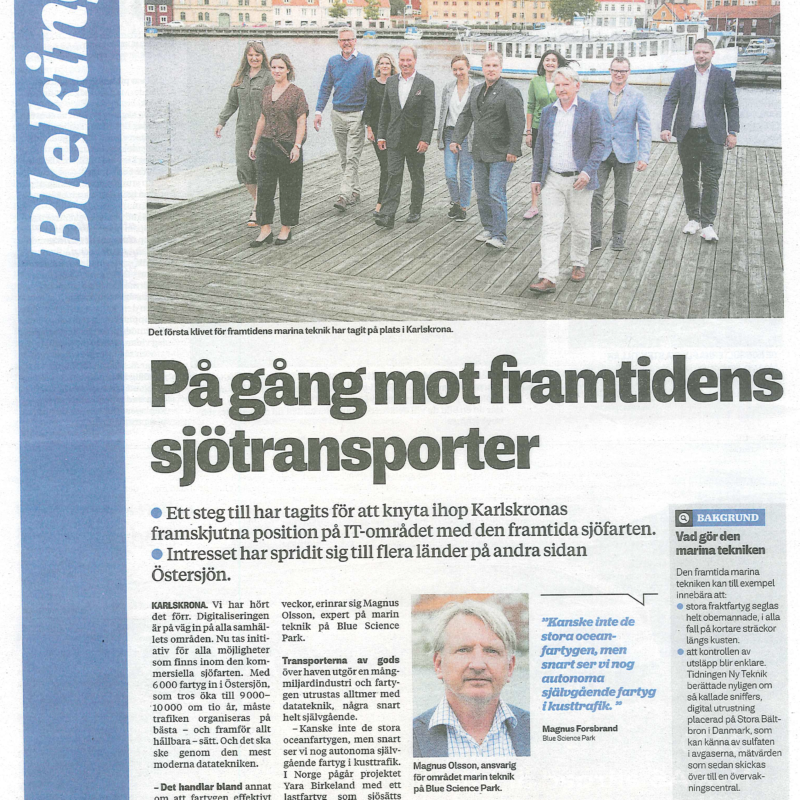
SEMAR – Application name: Secure Digitalisation for Sustainable Maritime Transport Funding agency: EU Interreg South Baltic. Partner budget: €47 324.10 overall project budget €902 324.10. Sole Partner from BTH and responsible – Principal Investigator, PI (100%).
Project SECMAR deals with the emerging field of maritime cybersecurity. As the maritime transport sector is undergoing rapid digital transformation, the issues of security is falling behind. The aim of SECMAR is to increase the level of security and build up the competence in the Baltic Sea area in the ongoing digitalisation of the shipping and logistics sector, through connecting maritime stakeholders with the IT-sector and the academic fields of cybersecurity, Big Data and Internet of Things.
Read more SECMAR about
Connect2SmallPorts: South Baltic Small Ports as Gateways towards Integrated Sustainable European Transport Systems and Blue Growth by Smart Connectivity Solutions.
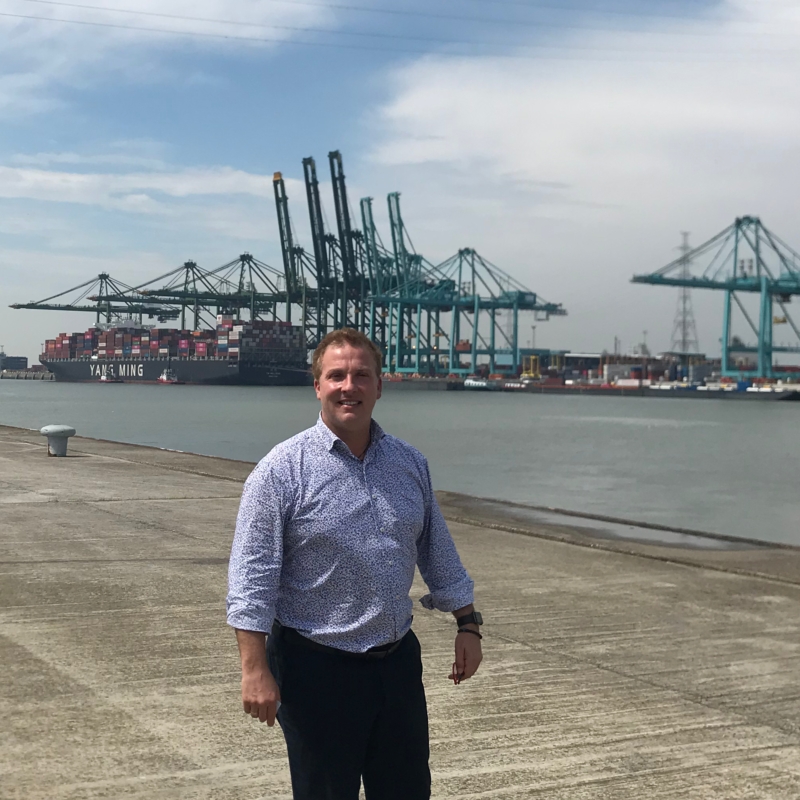
Connect2SmallPorts – Application name South Baltic Small Ports as Gateways towards Integrated Sustainable European Transport Systems and Blue Growth by Smart Connectivity Solutions. Funding agency: South Baltic Cross-border Co-operation Programme 2014-2020. Partner budget: €475 500,00 overall project budget: €2 005 000,00. Sole Partner from BTH and responsible – Principal Investigator, PI (100%). Project No. STHB.03.01.00-DE.0133/17-00. https://southbaltic.eu/-/connect-2-small-ports
Connect 2 Small Ports project aims at supporting the development of South Baltic small and medium ports by helping them to implement digital solutions, and thus give a competitive advantage. Distribution of digital technologies for transport in South Baltic ports and their service portfolios is very limited, not shared and not integrated on the cross-border level. These digital technologies o which the project focuses are of two sorts : Internet of Things (IoT) and Blockchain. IoT is basically connecting items (containers, port equipments) to an online network. Port authorities, shipping companies and other interested partner would then be able to track, and get information from, containers, vehicles etc. Blockchain will allow paperless administration follow-up, as contracts / decisions / communications will be saved and archived, a new version being securely created without compressing the previous ones. This toll is especially useful in cross-border shipping business.
Read more about Connect2SmallPorts at
http://www.connect2smallports.eu
SYMPHONY: Supply-and-Demand-based Service Exposure using Robust Distributed Concepts

SYMPHONY – Application name: Supply-and-Demand-based Service Exposure using Robust Distributed Concepts. Funding agency: The Knowledge Foundation, Sweden. Application number: 2019-0111. Partner budget: 750 500.00 SEK overall project budget: 3 370 044.00 SEK. Five partners from BTH – Principle Investigator, PI (10%).
The Symphony project aims at investigating and solving the problem of exposing services by a marketplace in Cloudnative and federated environments, addressing the security, confidentiality, privacy and provenance needs for future applications of digital societies. By considering the use-case of data services for managing Renewable Energy Source (RES), the Symphony project seeks to develop solutions for securing, monitoring and accounting of service chains using blockchain-based techniques. In addition, the Symphony project applies a requirements-driven engineering approach that analyses the security needs of Cloudnative systems and of the RES use-ease as considered by the user. The project will implement a prototype for service exposure model using a service chain for RES on TRL 4/5 (“Technology validated in lab /relevant environment (industrially relevant environment in the case of key enabling technologies”).
The expected contributions from the Symphony project are derived front the main research question (MRQ) and matching with the needs of the business partners. Thus, the Symphony project embraces the co-production of its results with the industrial partners as well as contributing to significant scientific results.
Read more about SYMPHONY at
https://www.bth.se/eng/about-bth/organisation/faculty-of-computing/dida/symphony_kks/
CTCC: Creative Traditional Companies Cooperation
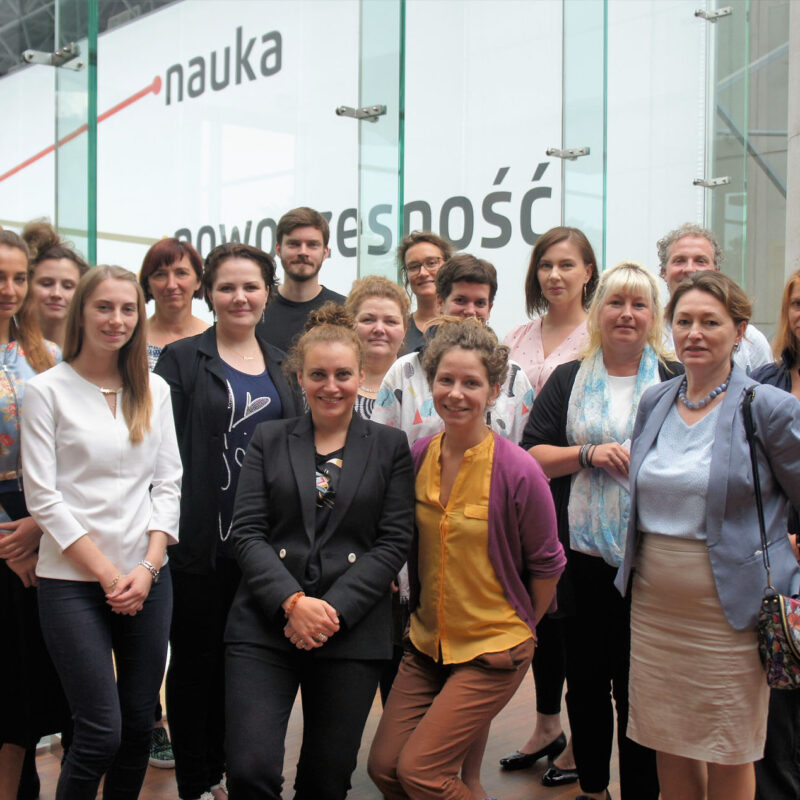
CTCC – Application name Creative Traditional Companies Cooperation. Funding agency: South Baltic Programme 2014-2020. Partner budget: €212 900.00 overall project budget: €1 583 075,00. Sole Partner from BTH and responsible as Work-Package Leader 4– Principal Investigator, PI (100%). Project No. STHB.01.02.00-DE.0077/16-00. https://southbaltic.eu/-/ctcc-creative-traditional-companies-cooperation
Traditional industry sectors are the backbone for regional economy, but they suffer from pressure resulting from the environment impact. Maritime transport is vital for regional development and in the entire EU, since approx. 90% of goods destined for markets other than the EU is supported by maritime transport. Maritime related activities that of transport and shipbuilding, energy producing & energy utilisation as well as coastal tourism incl. small-scale infrastructure (yachting and cruising) are forced to search for new innovative and sustainable solutions as a result of environmental pressure (e.g. to reduce greenhouse and other emissions), to comply with new policy regulations for transport and related activities and to change the negative or ZERO innovation performance according to the recent JRC Technical Report on Blue Growth and Smart Specialisation (2016).
CTCC improves innovation performance of key target group – minimum 200 Danish, German, Polish, Lithuanian and Swedish small and medium- sized enterprises (SMEs) from the South Baltic Sea Region (SBSR) until 30th June 2020 from three targeted traditional manufacturing sectors that contribute to blue and green growth improved innovation of traditional SMEs is achieved by engaging in cross-sectorial collaboration with 100 freelances, start-ups and SMEs from three Creative Industries. Project delivers four cross-border solutions for innovation development, management & exploitation:
1) triple-helix creative-business partnership and creative brokering platform facilitating innovation;
2) cross-sectoral innovation training methodology;
3) 30 specific demand-driven innovation solutions for traditional SMEs and regions, such as environmentally-friendly and ergonomic ship design, simulators for maritime applications; improved secure and safe navigation signs at harbours and coastal areas; and
4) four sustainable self-running and financing mechanisms for developed models exploitation beyond the project life.
CTCC is a non-profit project, part-financed from the Euro- pean Regional Development Funds (ERDF) within the South Baltic Programme 2014-2020. CTCC consortium consists of 10 direct partners and more than 30 associated partners aims at enhancing innovation capacity and improving innovation performance within product, service, processes or market portfolios of traditional sector Small and Medium-Sized Enterprises (SMEs). Together with creative people from the Creative Industries (design, architecture, adverting and software & games) we work for you – our target group – traditional sector SMEs from the South Baltic Sea Region (SBSR) covering coastal regions of Denmark, Germany, Lithuania, Poland and Sweden until 14th January 2021. In this, we contribute to Blue and Green Growth in the Region and the EU.“
Read more about CTCC at
Connect2SmallPorts (Seed Money)
Connect2SmallPorts (Seed Money) – Application name South Baltic Small Ports as Gateways towards Integrated Sustainable European Transport Systems and Blue Growth by Smart Connectivity Solutions. Funding agency: South Baltic Cross-border Co-operation Programme 2014-2020. Partner budget: €7 500,00 overall project budget: €31 975,00. Sole Partner from BTH and responsible – Principal Investigator, PI (100%). https://southbaltic.eu/-/connect2smallports
GOLNG: LNG Value chain for clean shipping, green ports and blue growth in Baltic Sea Region
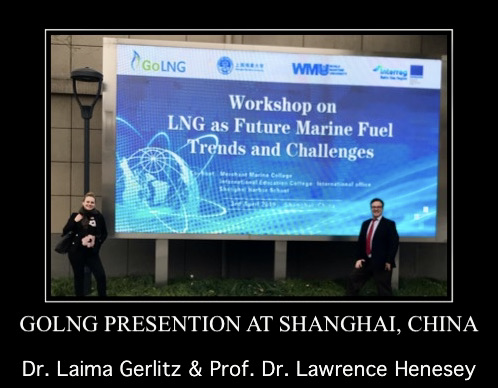
GoLNG – Application Name: GOLNG (LNG Value chain for clean shipping, green ports and blue growth in Baltic Sea Region / Go LNG). Funding agency: South Baltic Cross-border Co-operation Programme 2014-2020. Partner budget: €200 000.00 overall project budget: €3 297 000,00. Sole Partner from BTH and responsible –Principal Investigator, PI (100%). https://projects.interreg-baltic.eu/projects/go-lng-24.html
Increasing air pollution in port cities and strict environmental regulations (e.g. the introduction of the Sulphur directive as of IMO MARPOL Annex VI) made it crucial for the maritime and transport industries to search for alternative fuel and energy sources. Liquefied Natural Gas (LNG) promises to present a solution for their dilemma.
Project “Go LNG” is a response to the ever-changing situation on the LNG market. It is focused on the development of demand and accessibility of LNG in the Baltic Sea Region (BSR). The project activities are aimed at the implementation of the EU Clean Fuel Strategy and the EU Directive on Deployment of Alternative Fuel Infrastructure in order to establish a strategic approach for the development of LNG infrastructure and promote its usage in the transport industry.
The strategy needs to be relevant for the industry as well as maintain and facilitate business partnerships, competence building and higher demand by adding users or providing business models for existing and upcoming LNG infrastructure.
LNG infrastructure is a pricing bottleneck. At some point it can reach more than 50% of the LNG energy cost, due to the fact that LNG is not yet widely used and is serves only one user. Therefore the GO LNG project is looking into possibilities to show how the existing LNG infrastructure and technology can benefit all LNG users and make it more competitive in terms of availability and pricing.
Subsequently, the project will establish a BSR LNG business cluster that will help the transport and marine technology industry be more competitive towards the Blue growth strategy, establishing the value chain for the BSR as a hub for clean shipping, competence and technology in LNG for transport. The aim of the cluster is to promote innovation and business projects, providing solutions for existing and upcoming users. It would also enhance everyday LNG usage i.e. LNG powered trucks and ships, LNG energy or LNG power for inland waterways.
The BSR already is one of the leaders in LNG usage, with LNG being one of the most relevant options in achieving environmental regulations (SECA, NECA) not only in Europe but all around the world. These regulations will soon apply to other regions, requiring from them working examples and solutions.
In order to use our advantageous position, we need a value chain able to provide worldwide LNG services, relevant to the maritime industry and building up on the fact that the BSR is the leader in this particular field. There is a plan to establish a BSR LNG competence center, working on the existing LNG polices, R&D and business models.
Baltic countries have already invested a significant amount of money into energy independence (Poland and Lithuania have built large scale import terminals, further small scale LNG terminals are coming) and there is a strong need to better utilize already existing infrastructure to open this new economic sector for local industries and expand the services, providing not only regasification but also bunkering and transshipment.
Regional industries would also benefit from governmental investments and higher energy security, increasing LNG usage as energy source and helping to cover the country’s domestic energy demand. The GO LNG project is based on the MarTech LNG initiative that was a flagship project in the EUSBSR. The project gathered an efficient LNG business and expert network that already resulted in business projects valued at EUR 46 mln.
Since the GO LNG project is based on the previous initiative, it is very likely to be successful in establishing the BSR LNG business cluster and competence center. The GO LNG project was initiated due to stakeholder interest in a more structuralized business cooperation model and LNG knowledge distribution in the BSR. The project consortium consists of 18 partners from 6 different countries and gathers all major LNG stakeholders in the BSR.
Read more about GO LNG at
SEA TERMINALS: Smart Energy-Efficient and Adaptive Port Terminals

SEA TERMINALS – Application Name: Smart Energy-Efficient and Adaptive Port Terminals. Funding agency: EU TEN-T Annual Programme. Partner budget: €0 (Stakeholders Interest Group – Associated Partner status). Overall budget_: €3 136 948.00. Sole Partner from Vahle GmbH and responsible –Principal Investigator, PI (100%). http://www.seaterminals.eu/
Smart, Energy Efficient and Adaptive Port Terminals – SEA TERMINALS aims to boost the evolution of the port industry towards a progressive and effective low-carbon emission operative model, integrating smart and energy-efficient technologies (hybrid machinery concepts, LNG as a fuel, electrical heavy-duty vehicles) through innovative business and energy-efficient solutions, focused on heavy-duty handling machinery and equipment.
SEA TERMINALS takes as point of departure the lessons learned from the successful TEN-T GREENCRANES co-funded project, which has demonstrated that alternative fuels and smart energy management can produce remarkable positive effects on energy consumption and GHG emissions reduction. SEA TERMINALS aims to keep the way opened by GREENCRANES and continue developing innovative concepts based on retrofitting and last-generation technologies able to be deployed into the port industry market quickly, thus fostering the development of available eco-efficient alternatives for European ports.
SEA TERMINALS will demonstrate by means of real life trials in the ports of Valencia (Spain) and Livorno (Italy) an integrated and comprehensive set of prototypes based on low-carbon emission technologies implemented in last-generation port machinery and equipment. All the prototypes tested and piloted will be business and market-sided oriented, thus being demonstrated their investment feasibility.
Read more about OVERSIZE Baltic at
GREENCRANES: Green technologies and eco-efficient alternatives for cranes & operations at port container terminals
GREENCRANES – Application Name: Green technologies and eco-efficient alternatives for cranes & operations at port container terminals (GREENCRANES). Funding agency: EU TEN-T Annual Programme. Partner budget: €0 (Stakeholders Interest Group – Associated Partner status). Overall budget: €3 688 000.00. Sole Partner from Conductix AG / PEMA (Port Equipment Manufacturer’s Association) and responsible – Principal Investigator, PI (100%).
MarTech LNG: Marine Competence, Technology and Knowledge Transfer for LNG (Liquid Natural Gas) in the South Baltic Sea Region
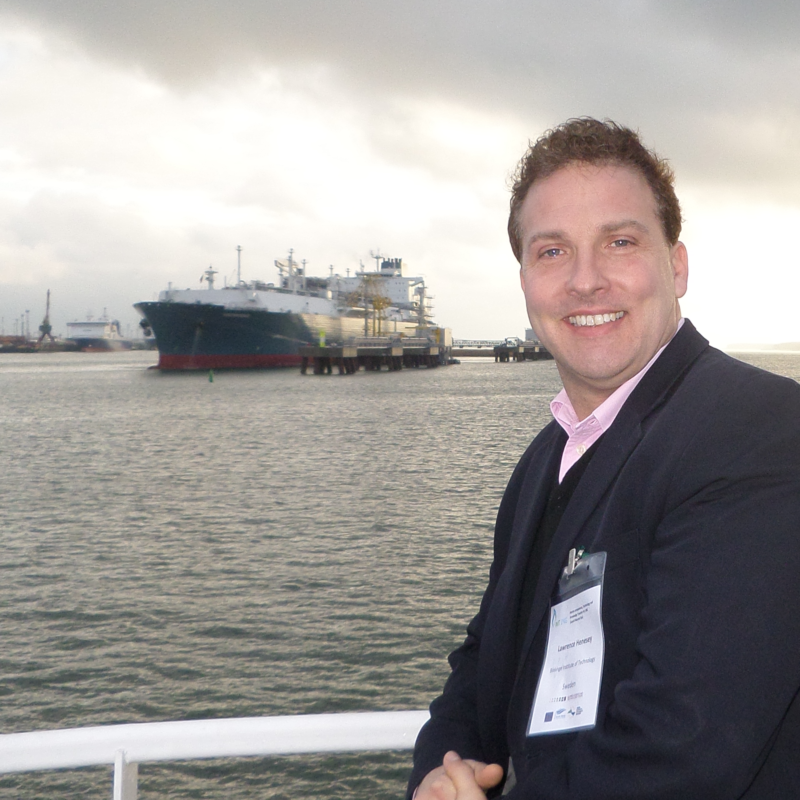
MarTech LNG – Application Name: Marine Competence, Technology and Knowledge Transfer for LNG (Liquid Natural Gas) in the South Baltic Sea Region (MarTech_LNG). Funding agency: South Baltic Cross-border Co-operation Programme 2007-2013. Partner budget: €155 148.00 overall project budget: €1 360 447,67. Sole Partner from BTH and responsible – Principal Investigator, PI (100%). http://ec.europa.eu/regional_policy/en/projects/germany/martech-lng-helps-south-baltic-region-reposition-itself-as-liquefied-natural-gas-hub
MarTech LNG – Marine Competence, Technology and Knowledge Transfer for LNG (Liquid Natural Gas) in the South Baltic Sea Region
The project aims at transferring tested and proven LNG knowledge and technology to implement into the South Baltic countries that are currently building LNG terminals.
The problematic nature of the project initiative is based on a current situation indicating that declared investments in Poland and Lithuania will not be a big benefit for the regional maritime industries because of the lack of technologies and relevant competences in respects of terminal construction and operation. This will instead be outsourced out of the countries of the SBR.
Supplying the local maritime industries with the LNG building and operation knowledge will allow them to benefit from the investments and support the development of new products and services that are demanded in the global market thus strengthening the Baltic maritime Sector.
Further more the creation of a Baltic supply chain will establish cooperation in between regional maritime industries and scientific institutions – locally, nationally and internationally and support the creation of cluster development being able to respond to international tenders in the future.
LNG appearance itself creates new business possibilities in transportation, port operations and energy sectors but it needs to be supported by scientific and technological knowledge to ensure a benefit for the local companies.
Project duration: January 2012 – December 2014
Project budget: 1,360,447.67 EUR
Project partners:
- PP1/Lead partner: Klaipeda Science and Technology Park (LT)
- PP 2: Klaipeda State Seaport Authority (LT)
- PP3: Klaipeda Shipping Research Centre (LT)
- PP4: Wismar University of Applied Sciences (DE)
- PP5: ATI erc gGmbH (DE)
- PP6: Maritime University of Szczecin (PL)
- PP7: Blekinge Institute of Technology (SE)
- PP8: Maritime Development Center of Europe (DK)
Read more about MarTech LNG at
OVERSIZE Baltic

OVERSIZE – Application Name: Oversize Baltic. Funding agency: South Baltic Cross-border Co-operation Programme 2007-2013 . Partner budget: €18 000.00 overall project budget: €769 610,00. Sole Partner from BTH and responsible – Principal Investigator, PI (100%). https://trimis.ec.europa.eu/project/oversize-baltic
Oversize cargos – constitute an economically important segment of commercial haulage. They include exceptionally large and heavy indivisible cargos such as electric transformers, reactor vessels, wind mills or airplane fuselage – which is usually a part of advanced infrastructural high priority energy and technology projects. Oversize transport often needs to travel considerable distance; in many cases, national borders have to be crossed. Currently there is an absence of European harmonized procedures and rules to obtain an oversize transport permits. The idea of the project “Oversize Baltic” is to contribute to the development of a South Baltic Region environment in which cross-border oversize transports can take place with a minimum of hassle, ideally in an interrupted way. The aim of the project is to pave the way towards simplification and, if possible harmonization of the rules and procedures to obtain an oversize transport permits as well as define the conditions under which procedures could be simplified by setting up an oversize transport corridors where vehicles meeting certain criteria would be allowed near automatic passage with the permit. The project consists of 5 Components. First component deals with management and coordination of the project, the second one deals with communication and dissemination activities. Next components 3,4 and 5 are content related. The following activities are dedicated to these components:
- Framework of information collection and evaluation for oversize strategy development;
- Regional oversize strategies of OT development;
- Marking the transportation routes/directions of oversize transportation along the SB coast. Oversize map;
- Study for the oversize legislation evaluation and improvement;
- Infrastructural and technological development study for the safe and effective transportation on marked routes;
- Strategy of economical impact;
- Technical and Informational conditions for OTIN development;
- Setting the web based tool for sharing and developing oversize transportation information development;
- Handbook for oversize transportation technical, legislative and geographical information necessary for permit issue and effective and safe transportation development and publishing;
- OTIN implementation: web network of OT regulation institutions; lobbing sessions;
- Oversize strategy implementation in to the business community;
- Establishing the infrastructural and technological connections for the strategy execution;
- Business training on safety and technology implementation issues and international marketing attracting the cargo flow;
- Study visits sharing the good practice-cooperation instead competition.
Target groups of the project: are policy makers, governmental institution responsible for transport infrastructure and development, research institutions, and business. The project will exposé the conditions and concepts which could greatly simplify the procedures and improve conditions under which important segments of the South Boarder Region economy, especially the building and productions sectors, have to operate, leading to a more timely and predictable oversize transports. The one-stop-shop concept where a haulier can apply for and obtain an oversize transport permit in a single location will be proposed.
Read more about OVERSIZE Baltic at
EWTC II: East West Transport Corriodor II - a green corridor concept within the Northern Transport Axis approach

EWTC II – Application Name: East West Transport Corriodor II – a green corridor concept within the Northern Transport Axis approach. Funding agency: 2007 – 2013 Baltic Sea Region. partner budget: €350 000.00 overall project budget: €5 992 400. Sole Partner from BTH and responsible – Co Principal Investigator, PI (20%). https://keep.eu/projects/15696/
The EWTC II project started in 2009 and was a follow up of the EWTC project completed in 2007, with the overall aim to highlight the development of a ”Green Corridor Concept” as a best practise case in the European context. Green transport corridors are defined as a concentration of freight traffic between major hubs and by relatively long distances where short sea shipping, rail, inland waterways and road complement each other to enable the choice of environmentally friendly transport. The Corridor stretches from Esbjerg, Denmark and Sassnitz, Germany in the west to Vilnius, Lithuania in the east. The eastern part of the corridor is a gateway to and from the Baltic Sea Region connecting it with Russia, Kazakhstan and China to the east and Belarus, Ukraine and Turkey to the south-east. It consists of an intermodal transport system with each of the different transport modes being links in the national and European transport system.
The project addressed the increased cross border traffic in the corridor between Esbjerg, strengthened the transport development through studies highlighting infrastructure improvements, new business solutions for, logistics, Intelligent Transport Systems (ITS), outreach activities to the Far East and co-operation between researchers. An increased transnational cooperation along the corridor was considered important in order to be able to deal with bottlenecks in the corridor. Another important area for transnational cooperation was the environmental aspects since trade and traffic in the east-west direction had increased dramatically. The final report of EWTC resulted in a vision, strategy and action plan supporting EU policies. The corridor has a potential to become an important east-west connection for Europe as it links northern Europe to Russia and the Far East as well as an entrance point to the Black Sea Region with the parts of Europe located in the Atlantic region.
Read more about EWTC II at
EAST WEST TC: East-West Transnational Transport Corridor in the S-BSR

EAST WEST TC. – Application name: East-West Transnational Transport Corridor in the S-BSR. Funding agency: South Baltic Cross-border Co-operation Programme 2000-2006 – partner budget: €250 000.00 overall project budget: €3 859 528.00. Sole Partner from BTH and responsible – Co Principal Investigator, PI (10%). https://keep.eu/projects/704/
The project will last for three years until 2012. 70 organisations and authorities from Denmark, Sweden, Germany, Lithuania, Russia and Belarus will be cooperating within the project that is led by the Regional Council of Blekinge.
BTH is liable for those parts of the project, which involves developing a manual for green transport corridors and for establishing an Information Broker System.
Read more about East West TC at
